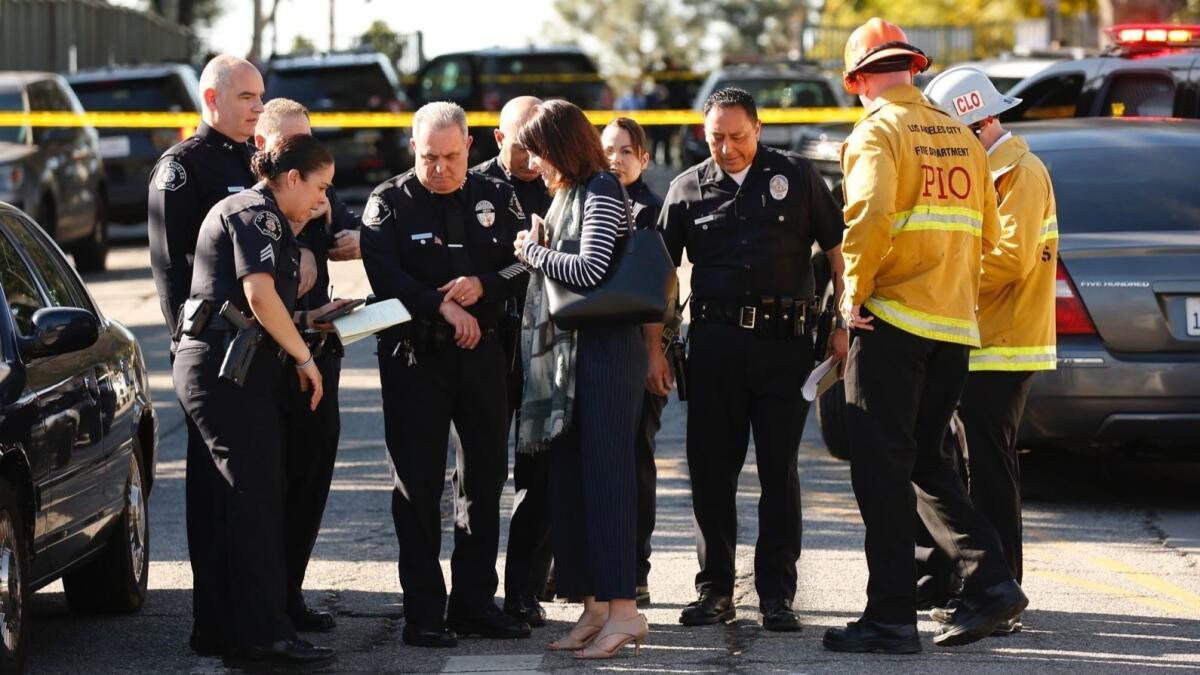L.A. schools fall short on safety measures, new report warns

- Share via
After the mass shooting at Florida’s Marjory Stoneman Douglas High School in February, Los Angeles school officials reassured parents that much had been done to keep local schools safe. California had tougher gun laws, after all, and the school district paid close attention to students’ mental health.
But a new report issued Monday by a panel convened to take a close look offers some cause for concern, flagging inconsistent campus safety measures, thinly spread mental health staff and inadequate coordination between the school district and other public agencies.
“With the stakes this high, we must strive to do better,” said L.A. City Atty. Mike Feuer, who assembled the panel.
The 21-member group was organized soon after the shooting that killed 17 in Parkland, Fla. It took a wide-ranging look at safety efforts on and off campus, including gun control, more secure routes to and from school, and work to unify law enforcement approaches in neighborhoods.
The panel recommended establishing a school district safety director distinct from the district’s school police chief, who already works with other law-enforcement agencies, and the district’s head of mental health services, who also has established connections with outside agencies.
The Los Angeles Unified School District has held itself out as a leader in school safety — and that may be accurate. But the nation’s second-largest school system still has significant vulnerabilities, the report found.
One weakness is the layout of older campuses, which were designed before architects worried about active shooters. More than 200 district campuses do not have a single, secure entrance to control access. (Even those that do often open multiple doors and gates at the start and close of each school day to handle the high volume of students.)
Also complicating safety, according to the report, is the relatively recent phenomenon of traditional public schools sharing their campuses with independently run charter schools. Under California law, charters have a legal right to available space and often use a portion of a campus that is set apart from the host school and that has its own entrance.
Another major issue is that not all classroom doors can be locked from the inside. The district says it has plans to address this problem over time.
Many recommendations focus on enhancing mental health services. A recent screening of 8,000 district students found that 26% were at high risk for traumatic stress. When 48,000 students responded to surveys in 2017, 19% reported that they had been bullied in the past year.
The district has about one psychiatric social worker for every 1,600 students. The ratio drops to one in 500 when personnel who provide related services also are counted. The report recommends at least one mental health professional at each school.
Feuer acknowledged that finding the money would be difficult, and urged the private sector and other government agencies to help.
L.A. school board member Scott Schmerelson said some key recommendations were doable in relatively short order because they involved “rethinking, reorganizing” rather than spending more.
Within the panel, the most debated topic was the district’s policy of conducting daily random handheld metal detector searches at middle schools and high schools. These efforts generally make “administrators (and parents) feel that their schools are safer while students are more likely to perceive their schools as less safe and more prone to disorder,” the report states.
A majority of the panel recommended ending the searches, although there was strong dissent. This fall, the district will reduce the frequency of searches to 10 days per month at some campuses.
The report does not recommend arming teachers or other school employees. Instead, it pushes for a multi-agency public-awareness campaign to educate people about laws requiring adults to store firearms safely, as well as outreach on the use of restraining orders that can prohibit certain individuals from possessing guns.
The panel wants to see greater enforcement to keep weapons away from those not allowed to have them, perhaps with “firearm tracing data and social-network analysis to monitor high-risk individuals.”
Another recommendation is for a new state law that would make improper storage a basis for prohibiting future firearm ownership.
Over two months, the panel held eight town hall meetings across the district and heard from from public officials, community members and experts.
Panel members included retired California Supreme Court Justice Carlos Moreno, former L.A. City Controller Laura Chick and Earl Paysinger, a former Los Angeles assistant police chief who is now a senior administrator at USC.
Among the group were students, community activists, clergy, experts in mental health and social work and representatives from the business community, district labor groups and law enforcement.
Twitter: @howardblume
UPDATES:
6:45 p.m.: This article was updated throughout to include comments from L.A. school board member Scott Schmerelson and comments from a news conference about the report.
This article was originally published at 10 a.m.
More to Read
Sign up for Essential California
The most important California stories and recommendations in your inbox every morning.
You may occasionally receive promotional content from the Los Angeles Times.











